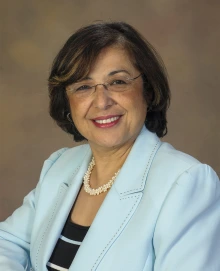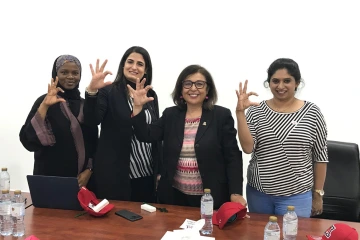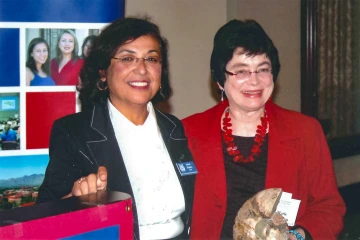Connecting with Dean Hakim: Changing World of Public Health
Dr. Iman Hakim shares her views on the pandemic, changes in public health education, and her pride in the college.
As the Mel and Enid Zuckerman College of Public Health continues its celebration of 20 years of education and service to the community, one person is uniquely positioned to reflect on where the college has come, and where it’s going.

Iman Hakim, MD, PhD, MPH
In that time, the college has grown from 22 faculty members and less than 60 students spread out across two dozen physical sites, to three times the number of faculty, double the amount of research and more than 1,000 students studying in several degree programs. The college has also added a Phoenix presence, online programs and a central home in Roy P. Drachman Hall on the University of Arizona Health Sciences campus in Tucson.
Dr. Hakim recently shared her perspective on the past, the present and the future of the college.
What are you most proud of in these past 20 years?
What’s not to be proud of? The Mel & Enid Zuckerman College of Public Health has been building healthier communities locally, nationally and globally. That’s 20 years of touching lives across Arizona, 20 years of transformative education for students, 20 years of delivering programs that improve health outcomes for everyone from infants to grandparents.

Professor Richard Carmona, MD, MPH, FACS; college supporter Cliff Crutchfield; Dean Iman Hakim, MD, PhD, MPH
We lead with cutting-edge science and deep community commitments. Our faculty, alumni and students are finding new approaches to chronic disease prevention, community public health preparedness, family wellness and advocacy for public health policy.
Partnership is the key in all of the college’s experiential-based courses, where integration of meaningful community service enriches the learning experience of students, faculty and community alike.
Share your passion – why do you do this job?
I believe that everyone has the right to good health, and that public health education is key for developing public health leaders, creating change and reducing health inequities. Public health is a complex and challenging field. It requires team efforts that are both multidisciplinary and transdisciplinary in nature. Without good public health training and practice, we would not be able to fight the pandemic or any other emerging chronic or infectious disease.

In January 2020, Dean Iman Hakim, MD, PhD, MPH, visits with students in the Global Health Institute program to earn a dual MPH degree from the Mel and Enid Zuckerman College of Public Health at the University of Arizona and from Gulf Medical University in Ajman, UAE.
The time is right to focus on public health training and research, because future generations of public health leadership will inspire individuals to make healthy choices as a society, and to then work together to reduce the impact of chronic diseases and global epidemics. An understanding of public health is a critical factor of good citizenship and vital for the work of building healthy communities.
How has the pandemic affected broad perception or awareness of the public health profession?
In the midst of the most devastating pandemic of our lifetime, people now recognize that the impact of public health programs is both global and personal. This crisis has helped the community expand its definition and views of public health. Because we are leaders in public health science and community outreach, I’m confident that there will be remarkable changes on the horizon for the field of public health as an outcome of this global challenge.
How is the college shaping our community? What is the impact of the work being done here?
This is an unprecedented time in our state, our nation and our world. The College of Public Health has been at the forefront of this pandemic. We have been working hard to support all our communities and partners through the COVID-19 pandemic. We have been working closely with government and community partners in Tucson and Pima County, in the state of Arizona, and with the University of Arizona’s international partners to respond to COVID-19 with the best knowledge and expertise we have to offer as the regional leader in public health research and promotion.
Beyond the current crisis, collaboration continues to be key in the college’s initiatives. We feel a special commitment to our border and indigenous communities in Arizona and Sonora. We maintain a dynamic interchange between public health research and community outreach, translating research findings into community programs, and community needs into basic and applied public health research.
What would you hope to see in the next 20 years for this college?
The education of public health professionals is integral to the future of global health.

Dean Iman Hakim, MD, PhD, MPH, with founding Dean Emerita G. Marie Swanson, PhD, MPH, at the college’s 10th anniversary celebration.
In a time of rapid change, much depends on the readiness of the next generation of well-trained health care professionals and leaders who can meet the challenge of driving the public health field forward, based on our values, with innovative programs and research.
Our goal is to provide transformative public health education, scholarship, research, advocacy and leadership training for health care professionals worldwide.
In the next 20 years I would like to see that we can provide public health education and training to everyone. That’s why we started the undergraduate program, and we are planning to start another undergraduate focus on health and wellness.
We want to make sure everyone has the opportunity to study public health or learn about public health approaches regardless of their major, regardless of their career path. For me, I see public health like liberal arts – a basic understanding of public health will enable the leaders of tomorrow to make good choices, which will result in good outcomes.

